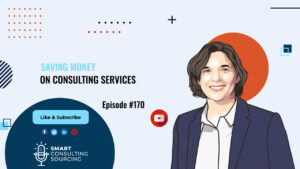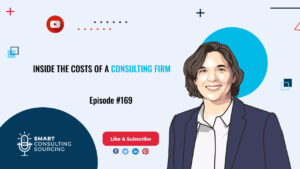Hello and welcome back to Smart Consulting Sourcing, the only podcast about consulting procurement.
I am Hélène, and today we will discuss why you need and RFP even when you don’t organize a competition.
However, before that, let me give a recap of last week’s episode.
As a client, you want to always work with the best. But Consulting is intangible, and it is difficult to measure the performance. Why should you care then?
While measuring the performance of consulting service providers is crucial for your business, it’s not a methodical and straightforward process. No wonder, 57% of companies don’t have a systematic Performance Evaluation system for the Consulting Category.
To begin with, the consulting firm you are familiar with is not always the consulting firm you need. Consulting firms are not commodities, and before you employ them, you should know what types of assignments they excel at.
Second, the competency of the partner or project manager is critical to the success of a consulting project.
Third, in order to manage your supplier panel successfully, you must have some measure of its performance. This is the fundamentals of category management.
And if you want a more detailed understanding of how your consulting suppliers perform, then there’s no better way than getting candid feedback from those who work with them!
And if you are curious to learn more you can listen to the complete podcast, Why measuring the performance of consultants matter?
However, this week, I want to discuss that “Why even without competition, you still need a RFP!”
WHAT IS AN RFP?
There are many consultants out there, and it’s quite likely that they’re all good ones. However, this doesn’t mean that they’re going to be right for you. What matters is to have a consultant that you trust and that has the right skills for your project.
When you buy goods or services, you have several options. One of them is to issue a request for proposal (RFP). An RFP is a document that solicits proposals from vendors and outlines the specific requirements for a project.
Overall, RFPs offer a number of benefits that can be helpful even when you are only considering one vendor. By taking the time to issue an RFP, you can ensure that your needs are met and that you have a thorough documentation of your decision-making process.
And you need to feel like the consultants you’re working have the right expertise and experience to help you. and are not just trying to impress you with everything they claim they can do.
And this is where the RFP would come into play. RPFs can be complex and time-consuming, but they are a necessary part of doing business.
Why is an RFP important even without the competition?
Every business has different needs, and those needs change over time. The Request for Proposal (RFP) process is the best way to ensure that you are getting the product or service that best meets your current needs.
While RFPs are often used in situations where there is significant competition among vendors, they can also be used when a company has a specific vendor in mind. In these cases, the RFP serves as a way to get the vendor to commit to specific terms and conditions.
Here in consulting this is about results as opposed to means. Means is time and materials: it means that the consultants are working by the hour whether you get the desired outcomes or not. But what most clients would rather pay a bit more and have the results, right? Of course the cost must be under control.
The first reason why it’s so important to have an RFP no matter what is that it will be complicated to determine what type of consulting firm you could work with unless you know what your requirements are. For example: if you have a Strategy project, is it a diagnosis or an implementation project that you are looking at because they are often not done by the same firms.
The next reason is because, if you don’t define the scope of your project, you cannot know what internal stakeholders will be impacted by the outcome of that project.
And why do I talk about change management? Because if you want the changes you implement to stick, you cannot change only the processes and the systems, you have to change the mindsets and the ways of working. Because humans are often change-adverse.
In order to maximize the chances of success, you should involve your stakeholders early on in defining scope and aligning expectations. This way there’s less chance for change management issues to derail the project later down the road.!
The timing is another factor that makes it important. It’s a balance between the project’s scope, manpower, and internal milestones that determines when it will be completed.
If you have a board in 6 weeks, then this will impact your project not only on the time line, but the team needed as well. And potentially the consulting firm that can work on the project.
Now let’s go to focus on result and this one is extremely important. The majority of consultants, including management consultants, strategy consultants, and others, commit to outcomes rather than resources.
So, how could they do that unless you specify the results you want in terms of goals and deliverables? If you don’t specify deliverables, you’re merely inviting a time-and-materials project. And if you are dealing with really high-level experts, it may get rather pricey. Additionally, you could get dissatisfied with the value for money.
And BTW, some people don’t write RFPs even when they are launching a competition and this brings us to the relative importance of fair competition.
You want to organize a fair competition when it’s possible and relevant, which isn’t always the case, but when it is, you want to do so.
And when you already have incumbents, they are familiar with your industry, your context, and your prior work on a given topic. The newcomers you wish to invite to an RFP will be at a disadvantage in that process if you don’t put that in writing and communicate it with them.
The reality is that your objective when conducting a competitive RFP process is to be able to select among a number of excellent alternatives. Therefore, you must create the ideal conditions for all consulting companies for them to submit those strong bids.
And now we’re going to talk about results and potential problems in contracts.
A consulting project is similar to a marriage in that everything is fine until it isn’t. If you haven’t planned on how to terminate the project, whether it’s at the end and you’re not satisfied or in the middle because it doesn’t deliver, you’re in a difficult situation.
Moreover, if you’ve clarified your expectations, if you’ve described what success looks like and what deliverables you’re looking for, you will be able to identify the deviations and either put the consultants back on track or just terminate the project early.
Ultimately, the final two components, The cost and the impact! probably the most crucial ones.
The cost of a consulting project is directly related to the scope of the work or the workload. You already know that how big or small you want your project to be will have a direct impact on how long it will take to deliver and how much it will cost.
A project’s success is often measured by its impact. This can be an increase in sales, a decrease in production costs, or a better valuation for the company. If the client is too ambitious, or the impact is not feasible, the project will be a failure. The scoping phase is a good way to identify such flaw. By clearly defining the result and impact of a project, we can ensure that it is achievable and realistic. Otherwise, we’re setting ourselves up for disappointment.
So, unlike any other purchase, in consulting, it has to be done in a certain way so you at the same time clarify the expectation but not restrict the consultant too much. Surely, they can bring the intelligence to the table with their expertise and methodologies.
The idea here is that the client, unless he is a former consultant in this specific field, is less knowledgeable than the consultant. So maybe you have to trust them… Besides there are some regulations attached to that. For instance, in France, a contract might be reclassified as disguised working if subcontractors are hired but managed directly, paid by the hour, and there is no specified project or worktable.
Moreover, apart from one reason, which is Fair competition, everything else is applicable even if you are not organising a competition.
However, you also want your supplier to be able to make it happen for you and I always remind my clients about the smart objectives. This is about defining what success looks like. You need to have KPIs or metrics.
And in smart objectives, the ‘A’ stands for achievable. That’s what it’s about. If you’re not sure about what is achievable, don’t hesitate to initiate the first round of discussion with providers through an RFI for instance.
Do you always need an RFP?
Well, if we put it like that , you don’t always need an RFP.
It means that, of course, you need to define your expectations but it’s not always the right tool for the project. This will depend on how mature you are on your project.
If you are wondering if you should launch a project and if you are looking at your options and you don’t have defined your needs and your scope. it means that you are at your ideation step then your best option is probably to go for an RFI, which is a Request for Information.
RFI’s are typically used when an organization is not completely clear on the problem that they are trying to tackle and is not yet ready to issue a formal request for proposal (RFP).
But if you already have your needs laid out and you have started the scoping and you are wondering what type of consulting can help me attain that objective. then indeed, you should work with an RFP.
The RFI responses are evaluated by the Procurement team, and used to short-list suppliers who will be invited to participate in the RFP process. RFIs can also be used after an RFP has been issued, in order to gather additional information about a particular supplier’s capabilities or pricing.
And talking about RFQs, it stands for request for quotation. RFQs are a type of procurement request that businesses use to solicit bids from suppliers for goods or services.
RFQs typically include specifications for the product or service being requested, as well as instructions on how to submit a quote. The RFQ process can be used to select a single supplier or to create a short-list of suppliers that will be invited to submit a more detailed proposal.
RFQs are often used in industries such as construction, manufacturing, and IT, where there is a lot of competition and suppliers are able to offer different prices for the same product or service. In these industries, an RFQ can help a company find the best value for their money.
However, RFQs are rarely used in the consulting world. The reason for this is that the service delivered by each consulting firm is always different. Even in the same capability, different firms will approach the work differently.
As a result, it’s difficult to compare proposals on an apples-to-apples basis.
What do consultants think?
There is criticism from consultants who state: “We don’t respond to RFPs” since clients and certain consultants associate RFP and bid procedure. However, this is essentially a shorthand meaning “We don’t participate in bids.”
But if you ask them, they want the requirements and expectations to be very clear.
The consultant I was talking to the other day said that he has spent hours refining the scope with his clients.
Because you need stakeholders signed up, make sure your scope is reasonable and all this other stuff before you can even start work!
They cannot just assume that their client is on board with all of its requirements before starting.Since they commit to results, it could lead them to spend more time than expected and therefore lose money.
And to give you guys something extra, I recently had a conversation with a partner for an MBB consulting firm, that told me that they were always keeping a buffer when they feel their clients are hesitant on the scope or too ambitious.
And as a result, you could pay more than you should, just because you didn’t take the time to sit down and agree on the work to do.
Additionally, clients occasionally use this to do some brain-picking. They then start the project on their own. You can imagine that consultants are no big fans of this behaviour.
In Conclusion,
So, to conclude today’s topic, A Request for Proposal, is a document that businesses use to solicit bids from potential vendors.
The RFP typically outlines the cost and scope of a project, and includes a timeline for completion.
Vendors then submit their proposals, which are evaluated by the business. The RFP process can be used for a wide range of projects, from web design to event planning.
In short, RFPs are a vital part of the modern business world, and there’s good reason why they’re here to stay.
So, the key to writing a successful RFP is to be clear and concise about your needs. This will help you to attract the right vendors and get the best proposals.
And consultants love nothing more than a well-defined RFP because it makes their job easier.
So if you’re thinking about issuing an RFP, remember to keep it clear, concise, and cost-effective.
And that marks the end of our podcast. Next week, I want to talk about Consulting fee: the state of the market. So, stay tuned.
Till then, stay safe and happy sourcing!
If you have other questions about why even without competition, you still need an RFP? Remember, you can always contact me directly on LinkedIn or by email because I am always game for a chat!
Bye and see you next week! Au revoir!
See you at the next episode. Till then, stay safe and stay connected with us through our community LinkedIn
and follow our Twitter handle @ConsQuest. Don’t forget to like and subscribe to our channels Podbean , YouTube
Happy Sourcing!







